‘I have come from hell on earth’: The Ukrainian refugees reaching the Hungarian border
The sea of refugees flooding the Hungary/Ukraine border have spoken to campaigns editor David Cohen about the horrors they have faced in recent weeks
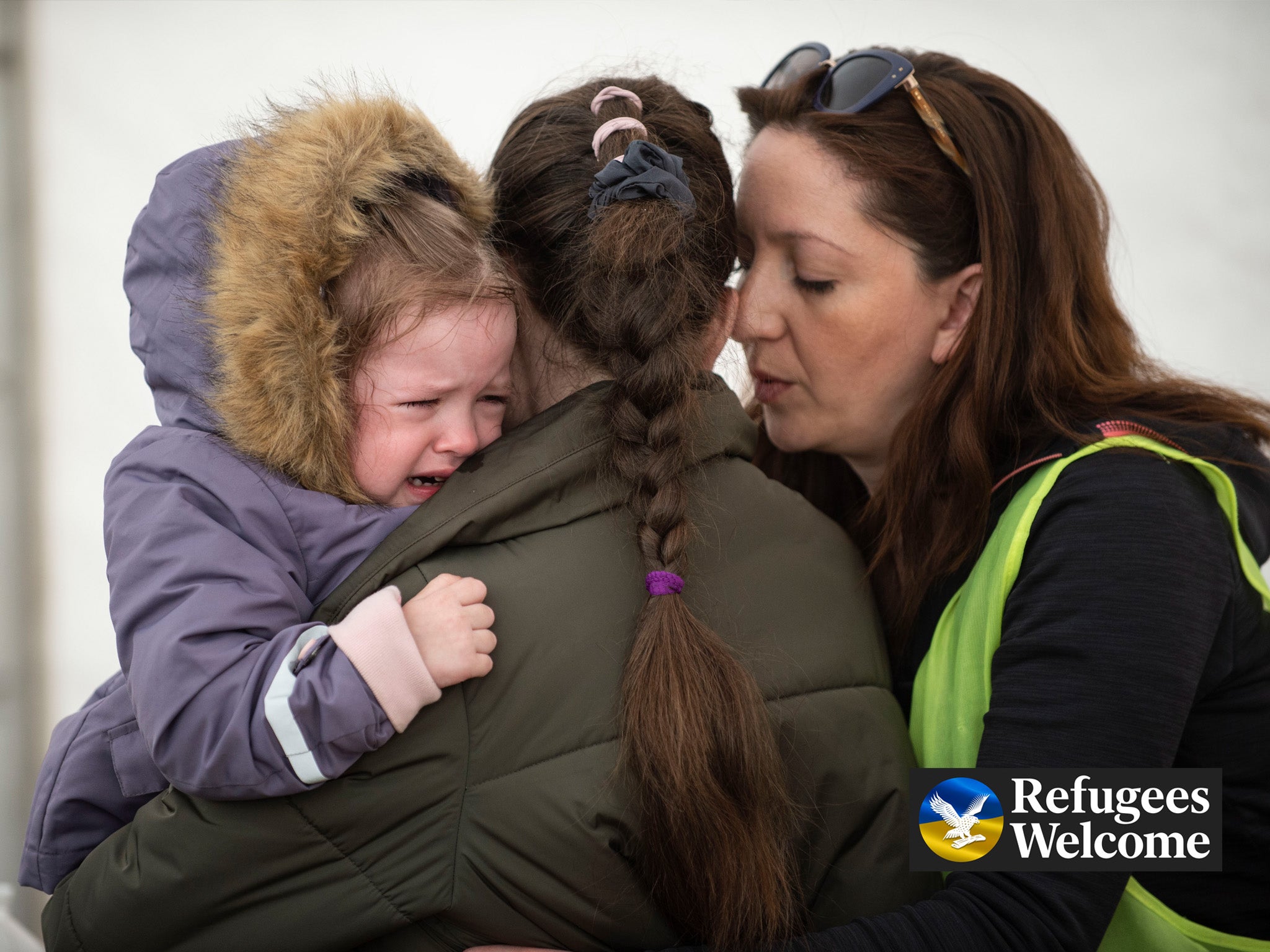
Your support helps us to tell the story
From reproductive rights to climate change to Big Tech, The Independent is on the ground when the story is developing. Whether it's investigating the financials of Elon Musk's pro-Trump PAC or producing our latest documentary, 'The A Word', which shines a light on the American women fighting for reproductive rights, we know how important it is to parse out the facts from the messaging.
At such a critical moment in US history, we need reporters on the ground. Your donation allows us to keep sending journalists to speak to both sides of the story.
The Independent is trusted by Americans across the entire political spectrum. And unlike many other quality news outlets, we choose not to lock Americans out of our reporting and analysis with paywalls. We believe quality journalism should be available to everyone, paid for by those who can afford it.
Your support makes all the difference.As the train from Ukraine pulled into platform 5 at Záhony railway station on the Hungarian border, a dozen police boarded and began to process the refugees, family by family.
One of the first to alight, her face gaunt and stricken, was Ekataryn Velychko, 35, a mother who had escaped from Mariupol with her daughter Anastasia, 8, and son Radion, 5.
“I have come from hell on earth,” she said. “For weeks we were in the basement with no water, no food, no electricity and no gas. My house is destroyed, the city is 90 per cent destroyed. Most people cannot get out. It is terrifying. My children are completely broken.”
Next to disembark was a heavily pregnant mother, Anna, also 35, with her son, Dima, 7, and her weeping mother Valentina, 70, three generations looking shattered after a 36-hour ordeal fleeing their city west of Kyiv.
“We were living in the basement under constant bombing for ten days,” said Anna. “We saw horrible things. Mothers giving birth to their children in the basement. I didn’t want it to happen to me.”
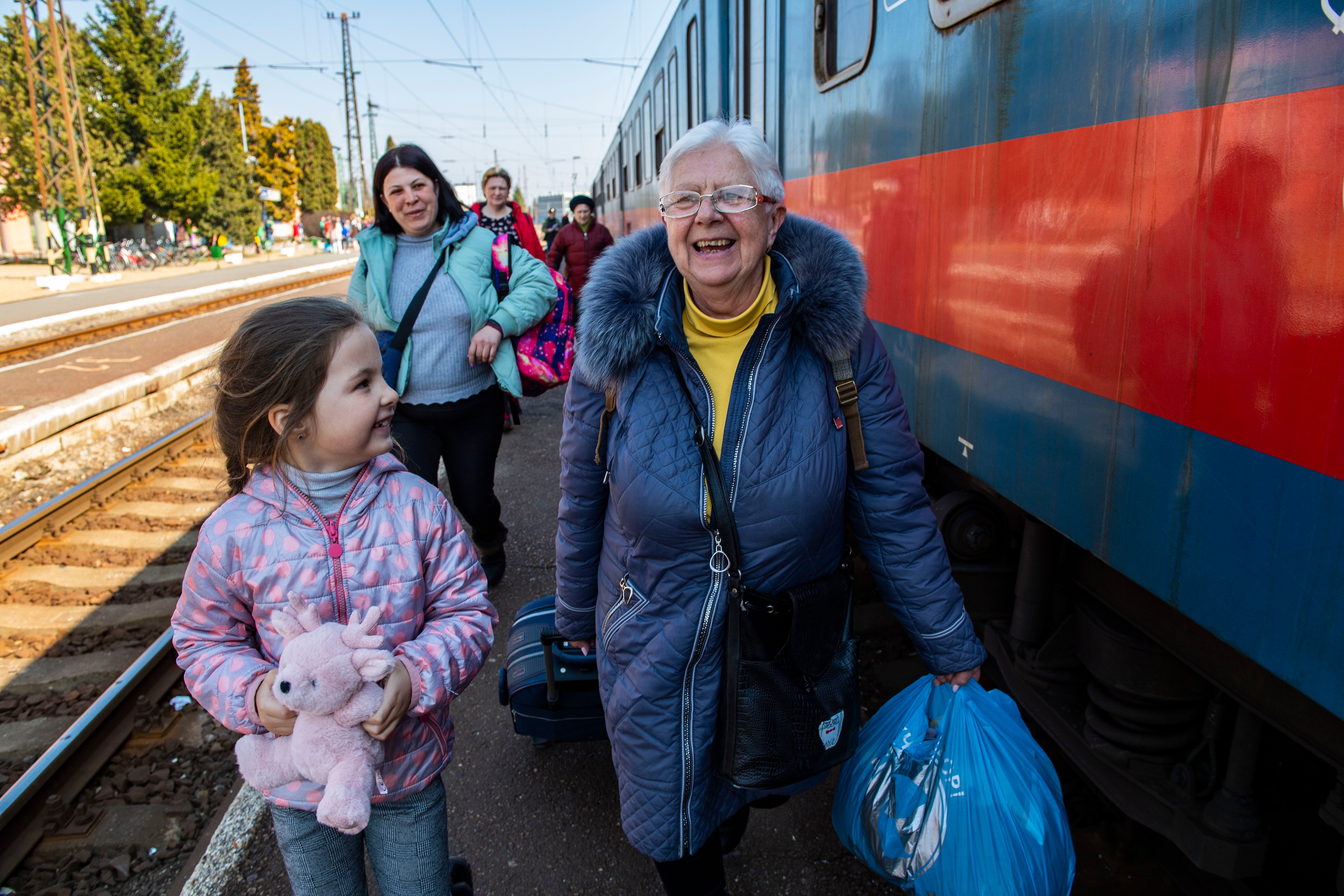
As family after family crossed the tracks towing their luggage towards the concrete concourse, others passed in the opposite direction. The others had arrived from Ukraine three hours earlier and were now boarding an onward train for Budapest.
Many, like veterinary surgeon Natalia Shulhan, 36, and her daughter Sonya, 7, were calm despite having been on the road for a week after fleeing Chernihiv, a city near Kyiv surrounded by Russian forces, as was Natalia’s case.
She said: “Our train from Kyiv to Chop and across the border into Zahony took 17 hours. Sometimes it stopped for hours in the middle of nowhere and we were scared we would be bombed. My daughter is very terrified and has been crying a lot so we’re trying to get as far from the bombs and Ukraine as possible. The Russians behave like Nazis, like animals, I hate them. We are going to Budapest and on to Austria, but we don’t know anyone in Austria.”
The difference in mood between the fraught, exhausted, tense refugees arriving and those leaving just a little lighter a few hours later was palpable, and the reason immediately apparent. From the moment they stepped off the train, around 30 aid workers and volunteers from around the world surged forward to carry their bags, assist mothers with babies, provide food, drinks, women’s hygiene products, toys for the kids and sometimes just a hug.
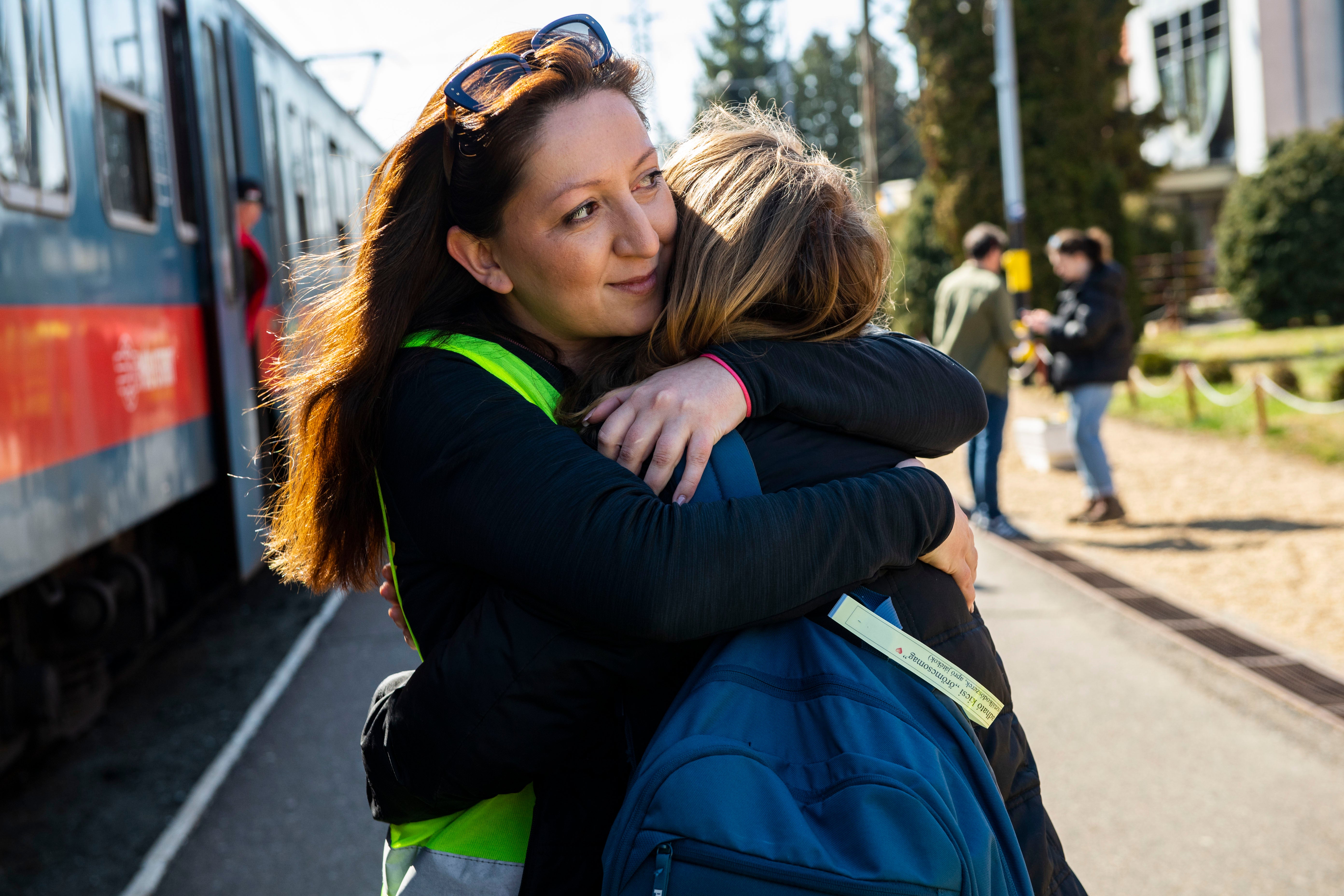
Among them were Israeli Jews and Arabs from the One Middle East Agency in their black tops and yellow vests, Hungarian Lutheran aid workers in green bibs, UNHCR aid workers in blue bibs and another local Hungarian charity in red.
The Hungarian Red Cross offered medical care and World Central Kitchen had set up a food marquee. Some volunteers were independent and unattached to aid agencies, with Ukrainian speakers especially in demand.
They included Marina Doron, 35, a mother of two from Israel who was born in Ukraine and had flown in a week ago. I watched Marina push a baby in a pram and at the same time support the baby’s mother who was trying to calm her screaming 2-year-old daughter.
The Independent has set up a petition calling on the UK government to be at the forefront of the international community offering aid and support to those in Ukraine. To sign the petition click here.
We want to get 250,000 signatures as soon as we can to help put as much pressure on the government as possible, please add your support today.
Marina said: “Yesterday a 20-year-old girl came with her sisters aged 14 and 4, so overnight she became a mum to two refugees. It was her first time abroad and she was scared – she had no plan and no idea where to go. I was able to assist with next steps, how to get to Budapest and what help to expect. Sometimes mothers just need help from another mother.”
Another volunteer, Anmol Gupta, 29, from India, had been studying to be a surgeon in Kharkiv and now offered his services as a translator. He had fled Ukraine 18 days ago on a motorbike, dodging incoming fire, but had to abandon it after a Russian bullet went straight through the petrol tank (he showed me the photo), missing him by inches.
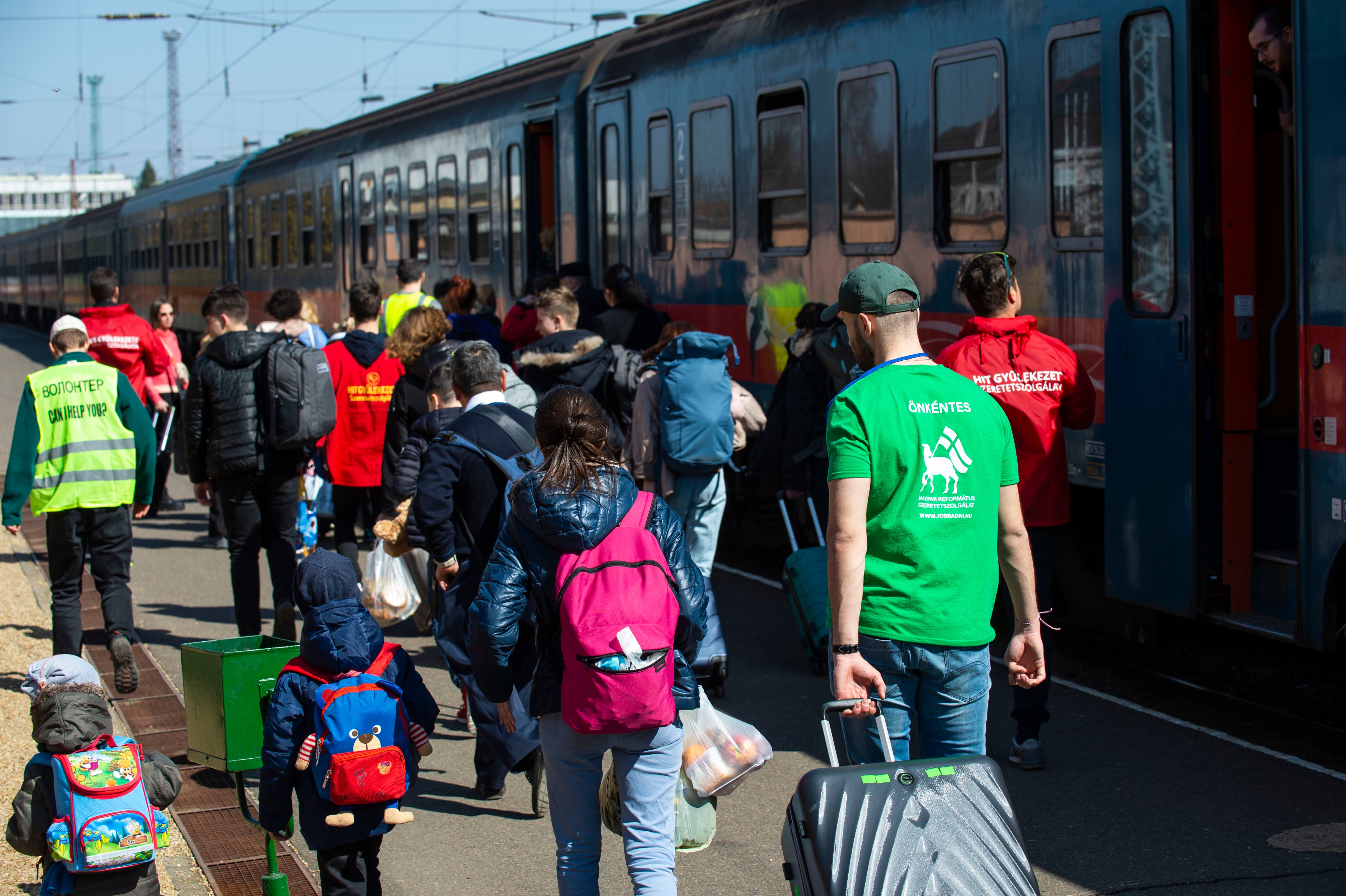
He ended up on a 27-hour train to the Hungarian border and decided to stay on in Záhony to help “because people are freaked out”.
“I have a room 500m from here which I use to shower but I sleep here in the blue tent because trains can come at any time and they need interpreters,” he said. Standing to one side were two Brits from Weston-super-Mare, handing out teddy bears and bringing smiles to children’s faces.
David Fricker, 39, a train driver, and Neil Sansam, 42, an engineer, had managed to secure a free 52-seater coach which they packed with 7,000 donated teddies and drove to Hungary, taking three days. “We have been here a week and handed out over 1,500 teddies,” said David.
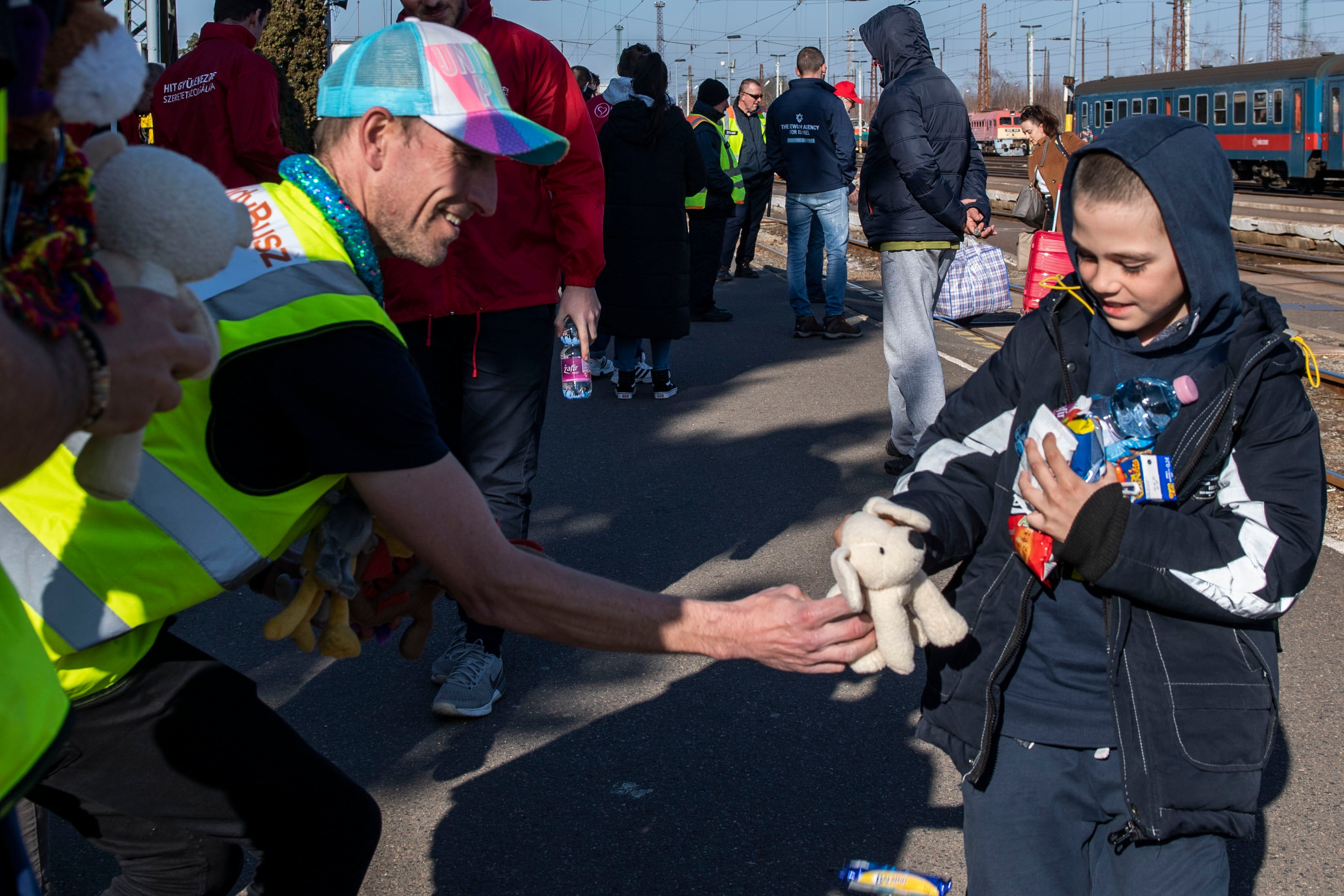
“With all the volunteers, there is a lot of kindness here. We are trying to bring a little joy for children who have been through a nightmare and to make them feel this is a nice place to be.”
As the Russian invasion entered its second month and with the number of Ukrainians fleeing to the west topping 3.6 million, over 325,000 people have passed directly into Hungary. They come via five border crossings, of which Záhony is the busiest.
Built in 1964, it features a Soviet-era statue of a woman releasing a dove of peace. Nobody notices its chipped façade, nor the irony.
There are meant to be eight trains a day here, one every three hours, but only around five actually come, and almost never on time. Yesterday evening the last train was seven hours late, arriving at 1.15am and carrying on it the entire youth team from Shakhtar Donetsk FC in eastern Ukraine.
In the first two weeks of the invasion, more than 3,000 refugees disembarked here every day. Numbers are now down to a few hundred, and most take the first train available to Budapest before fanning out across Europe.
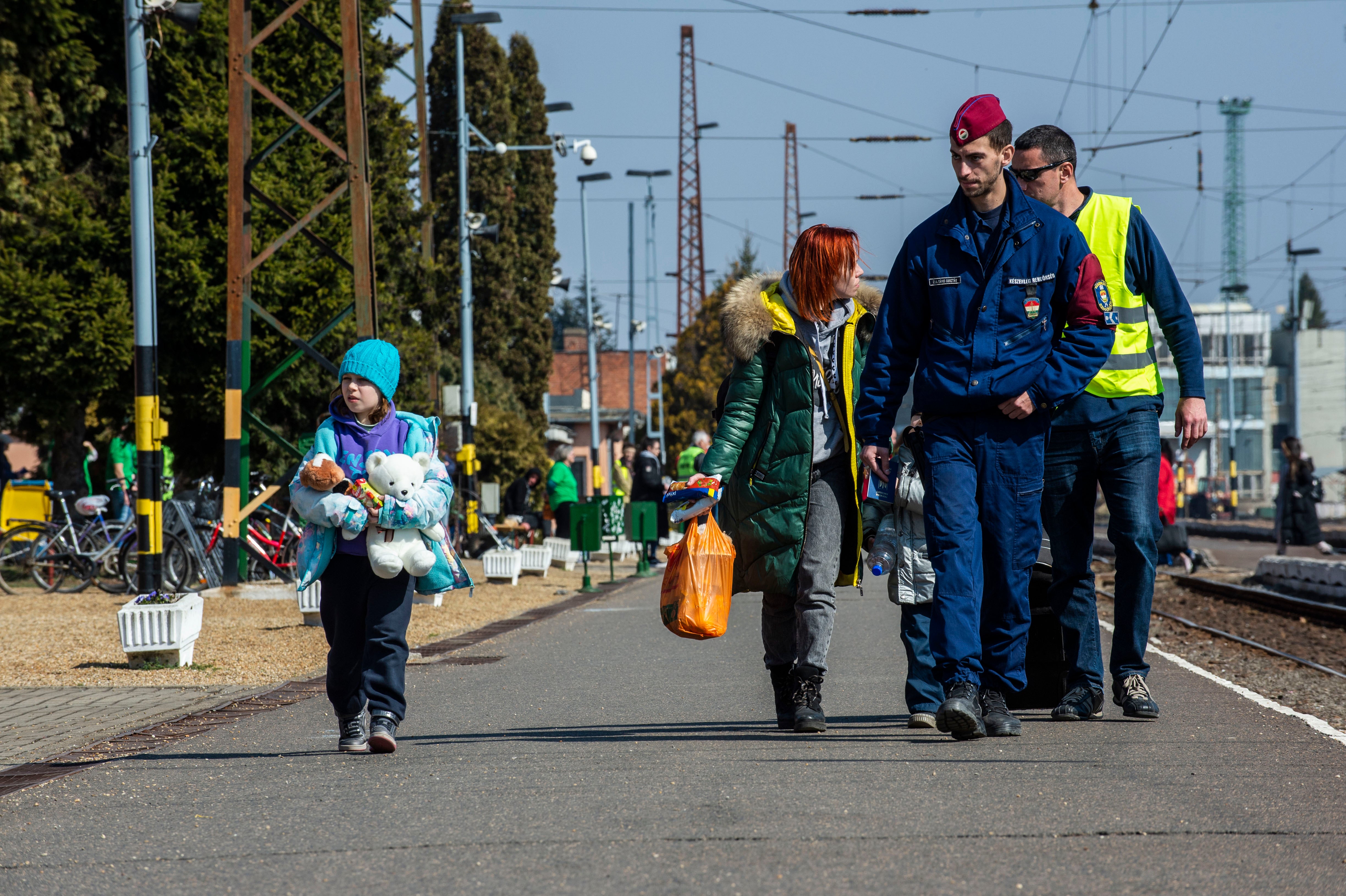
For those who want to shower and rest before moving on, the local high school has been transformed into a shelter with classrooms hosting up to 300 refugees on camp beds, though only 40 beds were occupied. One classroom had been turned into an emergency medical clinic by the Hungarian Red Cross, who call it the H-HERO centre.
Andras Molnar, 34, the team leader, is in charge of a team of 12 who operate between the train station and the high school, sleeping in the school. He said: “Currently around 20 refugees a day ask for medical assistance. Most are people with pre-existing chronic diseases who don’t have their medication with them, such as for high blood pressure or respiratory conditions, and also mothers and children whose immune system is low because they are depleted and exhausted.”
Meanwhile, the World Central Kitchen tent in front of the concourse filled to the brim as another 80 refugees arrived on the 2pm train and piled in alongside arrivals from the earlier midday train.
Among them I found Ekataryn, whose family did not have biometric passports but had been given 60-day temporary visas by the police, hungrily devouring a cup of hot soup.
Surrounded by her worldly possessions – reduced to a single suitcase, a satchel and a plastic bag – she said: “I can’t be calm because my husband can’t leave and the rest of my family, including my mum, are still in Mariupol and I have no way of contacting them and knowing if they are alive or dead. A lot of people can’t leave. You have to find someone who will risk taking you out, who has a car and petrol because most of the cars are destroyed and there is no gas and even if you find all these things, it’s risky because they are bombing all the time.”
At the next table, 28-year-old mother Maria Tkachuk fed her 19-month-old son Vsevolod in a high chair. “We ran away from Kyiv on the first day of the war,” she said.
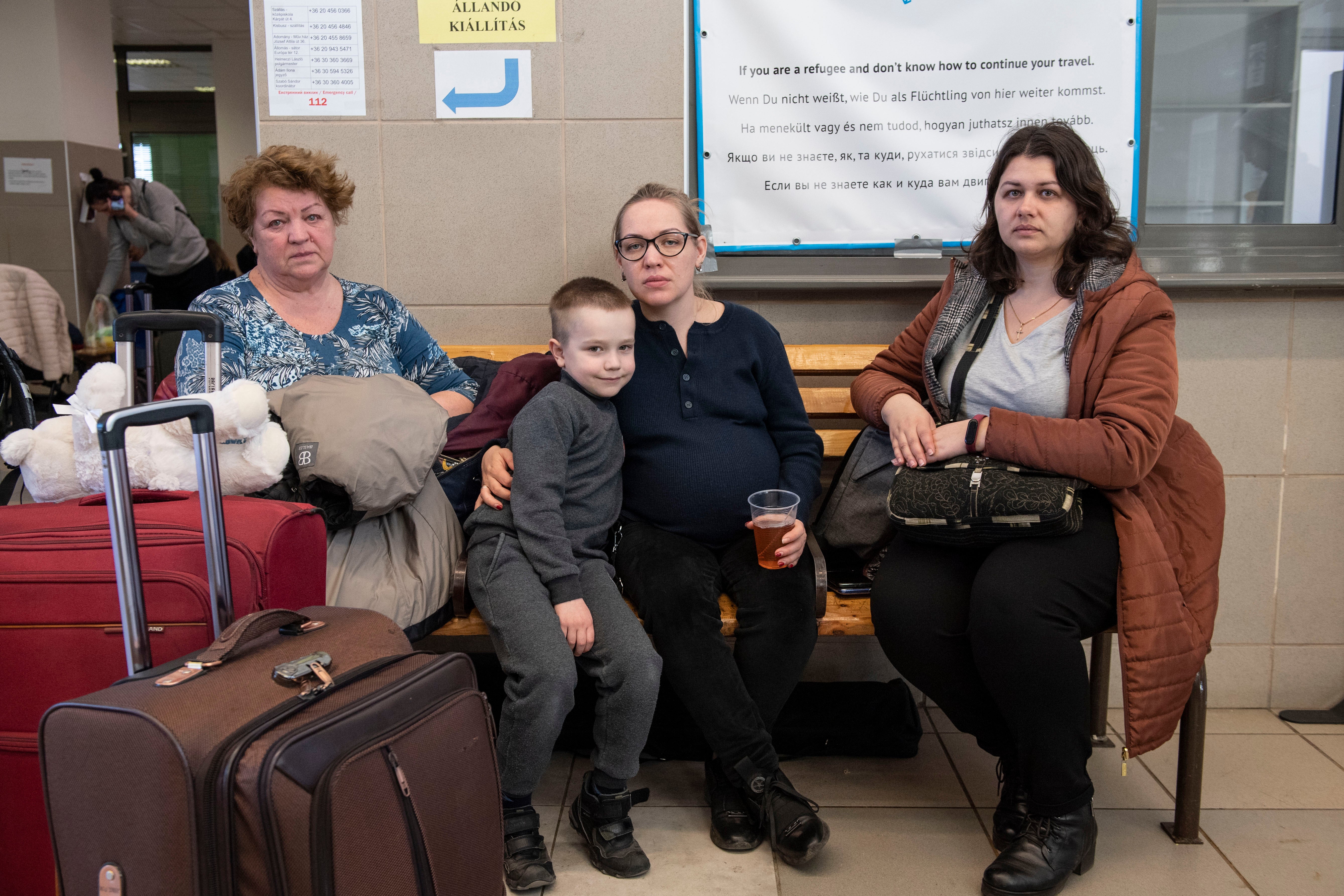
“We were living in a village 150km from Kyiv but yesterday we left at 7am and got here after 31 hours travelling. We were trying to find the courage to leave for a while because it’s hard to travel with a baby. My parents and husband had to stay behind, so it is terrible, but I came to save my son and we will go to friends in Spain.”
I spoke to Vita, 23, and Olya, 27, who had journeyed from Kherson, an embattled city in the south. “My mother refuses to leave because they took my brother who is 25 to the war,” said Olya, as Vita wept with her head in her hands. Olya’s brother is Vita’s fiancée. “We have booked a hotel in Germany for three days. We will have to figure it out from there.”
Soon the train came for Budapest and the concourse emptied. The arrivals board said the 5pm train from Chop in Ukraine was running 70 minutes late. I watched as six-year-old Nazar Ulan scooted around the near-vacant arrivals hall on a red plastic tractor while his mother, Nadia, tried to keep an eye on him, look after her other son, Vlad, 3, and call ahead to her sister in western Europe.
Nadia, who had travelled from Rivne near the Belarusian border, said: “This is my first time abroad and I am so scared. The Belarusian army are 200km from our home, ready to attack, so we come. It’s terrifying when people want to kill you and your family. Nazar didn’t want to leave without his father and said we can stay four days, no more. I don’t know how to tell him not to cry because I was crying too. But now I am telling myself I must not collapse because who will look after my children?”
Ninety minutes later, as Marina and the rest of the aid workers readied themselves, the next train rumbled in from Ukraine. As the new refugees crossed the tracks, hands reached out to hands. Inside the concourse, I checked in on Nadia but she and her boys had gone. Another child commandeered the plastic tractor. Another mother looked on.
Additional reporting and translating by Georgina Ruszinko
The Independent has a proud history of campaigning for the rights of the most vulnerable, and we first ran our Refugees Welcome campaign during the war in Syria in 2015. Now, as we renew our campaign and launch this petition in the wake of the unfolding Ukrainian crisis, we are calling on the government to go further and faster to ensure help is delivered. To find out more about our Refugees Welcome campaign, click here. To sign the petition click here. If you would like to donate then please click here for our GoFundMe page.
Join our commenting forum
Join thought-provoking conversations, follow other Independent readers and see their replies
Comments